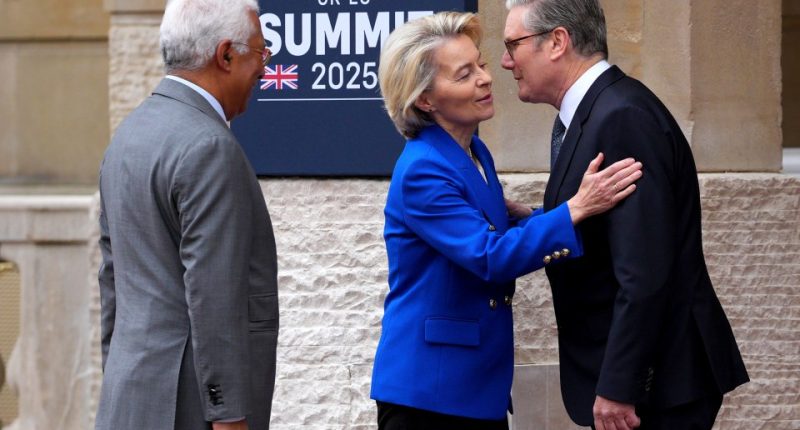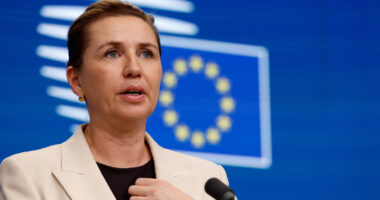Share this @internewscast.com
The UK is set to allocate funds to Brussels in a controversial agreement that reestablishes some influence of European judges over the country and permits French vessels entry into UK fishing waters for the next 12 years.
The agreement signed by Sir Keir Starmer in London today reveals the UK will be tethered to the EU’s rulebook on trade standards.
Brexiteers like Nigel Farage and Kemi Badenoch have denounced it as a “betrayal” of the 2016 referendum.
This deal requires the UK to comply with EU food standards while allowing only limited participation in the initial phases of rule-making, with the European Court of Justice as the final decision-maker.
In exchange, French boats and other trawlers from the continent will be given rights to fish off our coastline for 12 years.
Here is what the deal could mean for you.
Fishing Waters Surrendered
Sir Keir has agreed to give EU nations full access to its fishing waters until June 2038.
The 12-year concession undermines one of the primary promises of Brexit: regaining control over British waters.
UK fishermen, who were gunning for greater independence have expressed outrage at the major policy surrender.
They say they feel betrayed as foreign fleets continue to fish in areas they had hoped to dominate.
The long-term nature of this agreement means Britain will have limited scope to renegotiate or reclaim control for more than a decade.
The fishing industry in the UK may face substantial economic challenges, as EU countries gain from using British resources, putting UK fisheries at a disadvantage.
Elspeth Macdonald, chief executive of the Scottish Fishermen’s Federation, said: “This deal is a horror show for Scottish fishermen, far worse than Boris Johnson’s botched Brexit agreement.
“It is clear that Sir Keir Starmer made the whole deal on the backs of our fishermen and coastal communities, granting EU vessels 12 years of continuous access to UK waters at the last minute in order secure other objectives.
“This highlights the total indifference of the British political establishment to the interests of our fishing sector, with Sir Keir becoming the third prime minister after Edward Heath and Johnson to betray the industry.
“Giving away a national asset such as our rich and healthy fishing grounds for no discernible benefit not only fails both of these tests, but is a disgrace that will ensure the enmity of this proud industry for many years to come.”
Rejoining Erasmus
The UK has agreed to rejoin the EU’s Erasmus+ student exchange scheme, which is likely to require substantial financial contributions.
While the scheme benefits students by offering opportunities to study abroad, critics argue that the costs outweigh the benefits, particularly given Britain’s previous decision to leave the programme to save money.
Additionally, the programme’s inclusion in the deal may be seen as a reversal of Brexit independence, as Britain is re-committing to an EU initiative instead of investing in its own alternatives.
Free Movement for Youth
Sir Keir has agreed to continue talks on a new youth mobility scheme with the EU.
The visa route could open the door to millions of Europeans aged 35 and under moving to the UK to live and work – despite net migration figures remaining sky high.
While the scheme hasn’t been confirmed, under the current deal talks to make it happen must continue.
TOUGH TALKER IS A BIG BLUFFER

By CHRIS PHILP, Shadow Home Secretary
Whenever Labour negotiates, Britain loses.
Keir Starmer is shamefully giving away Chagos Islands and then pay to rent them back.
The two-tier tax deal with India was deeply unfair to British businesses.
And today, we will see him roll over once again at his EU surrender summit.
Immigration is likely to be part of Starmer’s surrender.
While he now talks tough on immigration for the cameras, we all know behind closed doors he doesn’t believe a word of it.
Starmer is still the same man who thinks cutting migration is “economic vandalism” and who said he wanted to close down immigration removal centres.
Today is Starmer’s first step in a walk of shame back to the EU’s stranglehold so he can crack Britain’s borders even wider open.
As recently as last month, his Minister for the EU personally told MPs, “It is not part of our plans”.
But the mask now has slipped, and the very same Minister has just admitted that they are going for a youth migration deal after all.
A scheme with the EU would cover people up to the age of 30 – and there are around 60 million eligible in the EU.
This could become free movement by the back door.
It would make it far easier for hordes of unemployed people to come to the UK at a time when Labour is driving unemployment through the roof.
Even more worryingly, a border surrender would jeopardise our national security.
Some EU member states, for example Germany, allow illegal immigrants from countries like Iraq or Afghanistan to become citizens after just three years after getting asylum.
These immigrants, aged up to 30, would then be able to come to UK under a youth mobility scheme.
However they try and spin it, this deal won’t be a so-called ‘reset’.
It is a surrender.
And I will stand firmly against it in Britain’s national interest.
Dynamic Alignment and Sovereignty Surrendered
The “surrender deal” has seen the UK commit to “dynamic alignment” with EU diktats in critical areas including as food safety, energy, and agricultural standards.
Alignment limits Britain’s ability to set its own standards on the likes of sausages and sapling.
Effectively, we are tied to Brussels’ decision-making.
The arrangement will help shorten lorry queues at the EU-UK border.
But crucially it undermines the principle of sovereignty that was central to Brexit.
Euro Judges Back In Charge
The European Court of Judgement will have final say on any UK-EU disputes covering food standards and trade.
This level of oversight undermines Britain’s judicial independence, another central tenet of the Brexit promise.
The arrangement also means that Britain is subject to rulings from a foreign court, a compromise of sovereignty.
More Taxpayer Cash Poured Into EU schemes
Britain will be required to splurge taxpayer cash on EU programmes and schemes it participates in.
These contributions could place even more strain on public finances, diverting funds that could otherwise be spent domestically.
Illegal Migration and Security
The deal outlines cooperation on the small boats crisis – but doesn’t provide concrete solutions.
However, there is mention of working more closely with EU agencies such as Frontex to crack down on channel crossings.
There’s broad talk of co-operation with Europol and exploring “mutual and reciprocal exchanges” on fingerprints, DNA and criminal records.
Access to E-Gates
Holidaymakers must be allowed to use European e-gates this summer to get to their destinations, Sir Keir Starmer warned today.
Travellers must not be delayed in leaving the airport by individual EU countries dragging their heels by holding up the speedy exit.
The PM said: “We will be and are pressing to get on with this straight away.
“Because for holiday makers wanting to get out this summer, they will want to know that they can do so easily, without delay and chaos.”
Sir Keir said he wanted to see the deal done “as soon as possible” claiming there was now no “inhibition” to it getting done.
He said: ““Today’s deal will also help British holidaymakers, confirming that they will be able to use e-gates when they travel to Europe, ending those huge queues at passport control.
“And I call on all EU members to help make this a reality without delay.”
But the e-gates news comes as European countries roll out their entry-exit scheme this autumn.
It will require third country nationals to provide fingerprints and biometrics. The plan could be accelerated if facial recognition is so accurate there will be no need for the fingerprinting.
When asked if there would still be a delay without a deal done on the entry-exit system, he added: “We want to reduce the friction as much as possible, I think there are probably some one-off measures that any new system is bound to need.
“But I want people to be able to cross borders quickly, easily, and I think e-gates is a really important step in the right direction.”
Limited Decision-Shaping Role
Under the deal, Britain will have limited involvement in shaping EU policies – but will be required to follow some of them.
While the UK will be consulted during the decision-making process, it will not have a formal seat at the table, meaning its influence will be minimal.
The lack of meaningful participation risks leaving the UK in a position where it is bound by decisions that may not align with our interests.
Climate targets
Britain’s climate policies will need to align with EU carbon rules.
The move limits the UK’s options for setting our own climate strategies.
The dynamic alignment with EU rules could constrain innovation and flexibility in sectors such as energy and industry.

















